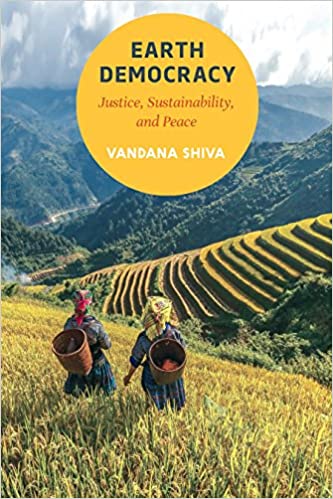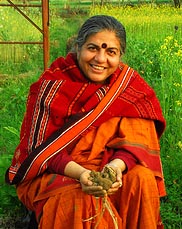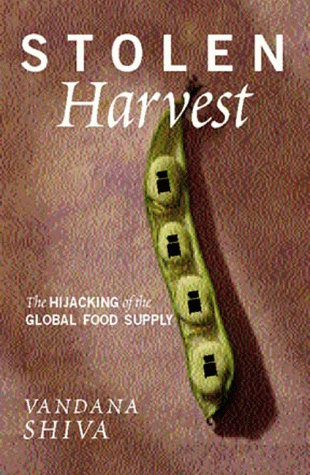 |
Home |
Catalogs |
Contact Us |

Books on:
Animal RightsBlack History
Clean Energy
Democracy
Eco Design
Eco History
Food and Nutrition
Genetic Engineering
Green Cities
Green Politics
Local Economics
Natural Building
Peace and Nonviolence
Simple Living
Trees and Forests
 |
Earth Democracy
Justice, Sustainability, and Peace
by Vandana Shiva
North Atlantic, 2015
Purchase
on Amazon.com
In Earth Democracy, world-renowned environmental activist and physicist Vandana Shiva calls for a radical shift in the values that govern democracies, condemning the role that unrestricted capitalism has played in the destruction of environments and livelihoods. She explores the issues she helped bring to international attention—genetic food engineering, culture theft, and natural resource privatization—uncovering their links to the rising tide of fundamentalism, violence against women, and planetary death. She presents "The People’s Project for a New Planetary Millennium," and outlines the principles of inclusion, nonviolence, reclaiming the commons, and freely sharing the earth’s resources for creating what she calls "earth democracy".
Quotes from Earth Democracy
The three economies
Why does the dominant economic model fail to meet the needs of so many societies and communities? Why is success, measured by economic growth, so intimately related to increased poverty, hunger, and thirst? There are two reasons why ecological disasters and the number of displaced, destitute, and disposable people increase in direct proportion to economic growth. First is the reduction of the visible economy to the market and activities controlled by capital. Second, the legal rights of corporations have increased at the cost of the rights of real people.
As the dominant economy myopically focuses on the working of the market, it ignores both nature’s economy and the sustenance economy, on which it depends. In a focus on the financial bottom line, the market makes invisible nature’s economy and people’s sustenance economies.
While the exchange of goods and services has always been a characteristic of human societies, the elevation of the market to the highest organizing principle of society has led to the neglect of the other two vital economies. When exclusive attention is given to the growth of the market, living processes become invisible externalities. The requirements of nature, not backed up by suitable purchasing power, cannot be registered or fulfilled by the market economy. Not only does this focus on the market hide the existence of nature’s economy and the sustenance economy, it hides the harm that market growth causes. As a result, especially in the context of Third World countries, nature’s need for resources gets ignored. So too are the requirements of the sustenance economy that provides for the biological survival of the marginalized poor and the reproduction of society. The hidden damage caused by market-based development and globalization processes have created new forms of poverty and underdevelopment. The political economy of Earth Democracy movements cannot be understood without a clear comprehension of the place of natural resources in the three distinct economies.
Furthermore, economic growth is leading to disenfranchisement and disposability of people as hard-won rights designed to protect people are increasingly transferred to corporations. Free-market rules for corporate freedom are increasingly rules that exclude real people from the economic and political affairs of society and disenfranchise them from nature. The legal status of corporations serves to hold the people running the corporations free from responsibility for the harm the corporations cause. And just as the corporation gained the legal standing of a person, the market, too, has become personified. More pages in the media are devoted to the "health of the market" than to the health of the planet or well-being of people.
Nature’s economy
Like the word economy, ecology also comes from the Greek word for home or household. Yet in the context of market-oriented development, economy and ecology have been pitted against each other. The market economy separates nature from people and ecology from economy. Nature is defined as free of humans. Conservation is reduced to "wilderness" management. Development is viewed as the exclusive domain of production. Nature and people’s self-provisioning economies have no productive role according to the market.
However nature’s economy is the first economy, the primary economy on which all other economies rest. Nature’s economy consists of the production of goods and services by nature—the water recycled and distributed through the hydrologic cycle, the soil fertility produced by microorganisms, the plants fertilized by pollinators. Human production, human creativity shrinks to insignificance in comparison with nature.
Natural resources are produced and reproduced through a complex network of ecological processes. Nature is the world’s dominant producer, but its products are not, and cannot be, acknowledged as such in the market economy. Only production and productivity in the context of market economics has been considered production. Organic productivity in forestry or agriculture has also been viewed narrowly with the marketable products as the total productive output. This has resulted in vast areas of productive work—the production of humus by forests, the regeneration of water resources, the natural evolution of genetic products, the creation of fertile soil from eroding rock—remaining beyond the scope of economics. Many of these productive processes are dependent on a number of other ecological processes and are not fully understood even within the natural sciences.
At present, ecology movements are the primary voice stressing the full economic value of these natural processes. The present scale of resource-ignorant economic development threatens the whole natural resource system with a serious loss of productivity. The market-oriented development process risks destroying nature’s economy through the overexploitation of resources and the uncomprehended destruction of ecological processes. These consequences do not necessarily manifest themselves within the period of a given development project. The short-term positive contribution of economic growth from such development may prove totally inadequate to balance the invisible or delayed damage to the economy of natural ecological processes. In the larger context, economic growth can thus, itself become the source of underdevelopment. The ecological destruction associated with uncontrolled exploitation of natural resources for commercial gains is symptomatic of the conflict over how wealth is generated in the market and in nature.
The Sustenance Economy: Bringing people back into the picture
In the sustenance economy, people work to directly provide the conditions necessary to maintain their lives. This is the economy through which human production and reproduction is primarily possible. It is the women’s economy where, because of the patriarchal division of labor, societal reproduction takes place. Women’s work provides sustenance and support to all human activities—including the visible activities of the market dominated economy. The sustenance economy is the economy of the two-thirds of humanity engaged in craft production, peasant agriculture, artisanal fishing, and indigenous forest economies. The sustenance economy includes all spheres in which humans produce in balance with nature and reproduce society through partnerships, mutuality, and reciprocity.
Without the sustenance economy, there would be no market economy. Sustenance economies exist even where capital markets do not. Yet capital’s markets cannot exist without the sustenance economy, nor can the market fully internalize the sustenance economy because externalizing the social burden is the very basis of profits and capital accumulation. As structural adjustments and globalization destroy livelihoods, women work longer hours, at multiple part-time jobs to feed their families. As privatization of health care dismantles public health systems, families take on the burden of looking after the ill. The more markets depend on work outside the market, the more the sustenance economy is rendered invisible, and left without resources.
The poverty of the Third World has resulted from centuries of the drain of resources from the sustenance economy. Globalization has accelerated and expanded the methods used to deplete the sustenance economy—the privatization of water, the patenting of seeds and biodiversity, and the corporatization of agriculture. This deliberate starving of the sustenance economy is at the root of the violence of globalization
Modern economics, the concept of development and progress, and now the paradigm of globalization cover but a minuscule portion of the history of human economic production. The sustenance economy has given human societies the material means of survival by deriving livelihoods directly from nature. Within the context of a limited resource base, diverting natural resources from directly sustaining human existence to generating growth in the market economy destroys the sustenance economy. In the sustenance economy, satisfying basic needs and ensuring long-term sustainability are the organizing principles for natural resource use, whereas the exploitation of resources for profits and capital accumulation are the organizing principles for the market.
Markets and the market
Markets are places of exchange. The bazaar, thriving even today in India, is a place where people exchange products they have grown and produced. The concrete, embedded market grows out of society. Based on direct relationships and face-to-face transactions, it is in fact an extension of society. When markets are replaced by the market, society is replaced by capital and the market becomes the anonymous face of corporations. Real people, exchanging what they create and what they need, are replaced by the abstract and invisible hand of the market.
There are two kinds of markets. Markets embedded in nature and society are places of exchange, of meeting, of culture. Some are simultaneously cultural festivals and spaces for economic transactions, with real people buying and selling real things they have produced or directly need. Such markets are diverse and direct. They serve people, and are shaped by people.
The market shaped by capital, excludes people as producers. Cultural spaces of exchange are replaced by invisible processes. People’s needs are substituted for by greed, profit, and consumerism. The market becomes the mystification of processes of crude capital accumulation, the mask behind which those wielding corporate power hide.
It is this disembodied, decontextualized market that destroys the environment and peoples’ lives.
The Domination of the Market
A key to the domination of the market economy is its ability to claim resources from outside of its scope. The transformation of land from public to private ownership was essential for the market economy to become the dominant economy. The transformation, known as the enclosure of the commons, was usually triggered by the greed and power of the privateers. The word enclosure describes the physical exclusion of the community from their commons by "surrounding a piece of land with hedges, ditches, or other barriers to the free passage of men and animals."
The land called the commons was formally owned by the landlord, but the rights to use it belonged to the commoners. It was the removal of these rights to common property that enabled enclosure. In England, where the movement began in the sixteenth century, the enclosures were driven by the hunger of machines, by the increased demand for wool by the textile industry. The landlords, supported by industrialists, merchants, and bankers, pushed peasants off the land and replaced them with sheep. "Sheep eat men" is how Sir Thomas More described the phenomena of the enclosures of the commons.
Your sheep, that were wont to be so meek and tame and so small eaters, now, and I had hear say become so great devourers and so wild, that they eat up and swallow down the very man themselves. They consume, destroy and devour whole fields, houses and cities.
The economics of enclosure worked for the landlords, but against the peasants. While one acre of arable land on the commons could produce 670 pounds of bread, it could only maintain a few sheep. In terms of the food and the sustenance economy this was a loss, since the sheep could only produce 176 pounds of mutton. However, in monetary terms, the landlords gained. A single shepherd tending the sheep produced much higher returns for the landlord than the rents paid by dozens of peasants. That the peasants were growing the food, fodder, fuel, and other essentials for their survival on the commons was, for the landlord, not a matter of consideration. The profits provided the necessary justification for the privateers to expand the market economy, despite the cost to nature’s economy and the sustenance economy.
Five processes constitute enclosing the commons.
1. The exclusion of people from access to resources that had been their common property or held in common.
2. The creation of "surplus" or "disposable" people by denying rights of access to the commons that sustained them.
3. The creation of private property by the enclosure of common property.
4. The replacement of diversity that provides for multiple needs and performs multiple functions with monocultures that provide raw material and commodities for the market.
5. The enclosure of minds and imagination, with the result that enclosures are defined and perceived as universal human progress, not as growth of privilege and exclusive rights for a few and dispossession and impoverishment for the many.
Enclosures were exalted as allowing "an unparallel expansion of productive possibilities." Productivity was defined from the perspective of the rich and the powerful, not from that of the commoner, and valued only profits and the benefit to the market, not nature’s sustainability or people’s sustenance. The rich "deplored the insubordination of commoners, the unimprovability of their pastures, and the brake on production represented by shared property." Despite the opinion of the landlords, the commons were not wasted land; they were a rich resource providing the community with a degree of self-reliance and self-governance.
The market created its own multiplier effect which pushed the sustenance economy further from view. The more the powerful gained economic and political power from the growing market economy, the more they dispossessed the poor and enclosed their common property. And the more the poor were dispossessed of their means to provide their own sustenance, the more they had to turn to the market to buy what they had formerly produced themselves.
When the cottager was cut off from his resources . . . there was little else that he could do in the old way. It was out of the question to obtain most of his supplies by his own handiwork: they had to be procured, ready made from another source. That source, I need hardly say, was a shop.
As it was with the land commons, so it is today with the biodiversity and seed commons through intellectual property rights and the water commons through privatization. Now the seeds, the medicine, the water that historically have been the common property of communities need to be bought at high cost from gene giants like Monsanto, who own the patents, and water giants like Suez, Bechtel, and Vivendi, who own the concessions. The transformation of common property rights into private property rights implicitly denies the right to survival for large sections of society.
Copyright 2005, Vandana Shiva
Table of Contents of Earth Democracy
Introduction — Principles of Earth Democracy
1. Living Economies
2. Living Democracies
3. Living Cultures
4. Earth Democracy in Action
About Vandana Shiva
Reader Comments |


